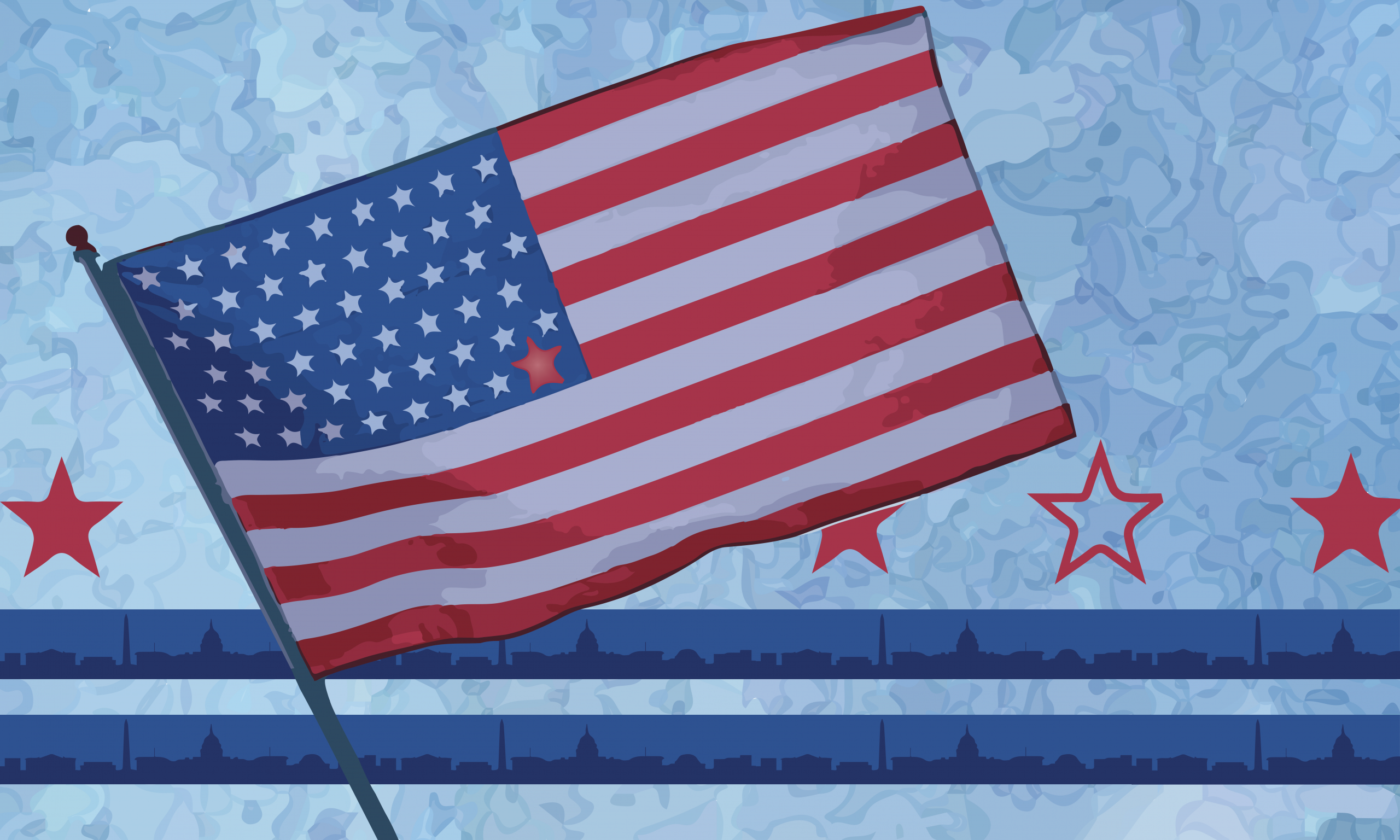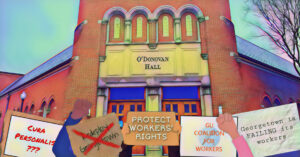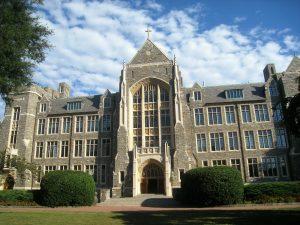Democracy means the people have a say. If you’re one of 717,000 people who live in Washington, you don’t have that. Congress took it from you.
D.C., a majority-minority city, is home to 315,000 Black residents from whom Congress openly and systematically denies statehood, federal representation, and equal citizenship. No voting member of Congress represents the District. D.C. contributes more per-capita federal income tax than any state in the country, yet its people have no say in how it is spent. The Senate, which is 89 percent white, disproportionately empowers whiter states, some with smaller populations than D.C., and prolongs the District’s disenfranchisement. In other words, a ruling white political class is yet again depriving Black and brown citizens of democratic representation.
D.C. has always been disenfranchised
Since the District was first officially organized, its residents have been disenfranchised. When D.C. received its first iteration of home rule via a municipal charter, Congress empowered white-only voters to popularly elect their own city legislature and, soon after, their own mayorship. Come 1871, just a year after the Fifteenth Amendment conferred suffrage to Black men, democratic choice for D.C. was, uncoincidentally, drastically curtailed. The people lost the mayorship, which was supplanted by an appointed governor, and soon afterwards Congress discontinued the elected council. D.C. would not have a locally elected government again until 1973. Political freedom for D.C. was always a matter of race.
Congress considered at least six different bills to grant D.C. home rule between 1948 and 1967. All six times, democracy died in committee. There was an understanding that a conservative coalition of Democrats and Republicans would object to the measure, which would be blocked by the filibuster just as civil rights legislation had been for nearly a century.
Does this sound familiar? It’s the exact same problem D.C. statehood runs up against today. Despite statehood legislation passing the House earlier this year, the measure will likely die in the Senate, blocked by the undemocratic filibuster rule. Today, a minority of just 41 senators, who represent as few as 75 million of almost 330 million Americans, can thwart any substantial legislation from the remaining 59 senators, D.C. statehood included. Democracy, dying in the halls of Congress.
Washington’s lack of home rule was the product of white supremacist paternalism—the insistence by empowered racists that the District’s Black population couldn’t and shouldn’t be trusted to run their own government. D.C.’s continued lack of statehood is a product of that same instinct.
Statehood means racial and economic justice
D.C.’s lack of political freedom cripples its leaders’ ability to equitably support its own population. Every year, D.C.’s mayor must submit the District’s budget to Congress for approval—something no other municipality in the country is required to do.
Not only does the federal government force the District to live under congressional stewardship, Congress has often neglected that responsibility. In 1995, after a recession and as a consequence of inadequate federal support, D.C. fell into a steep deficit. Private financiers prevented the city from borrowing more money to pay salaries or deliver even basic services, and congressionally imposed budget and tax limitations severely restricted D.C.’s ability to respond.
To solve the problem it had helped create, Congress appointed a Financial Control Board for the District in 1995. The appointed controllers exercised dictatorial power over the District for five years. In a furious attempt to “balance the budget,” they unilaterally rejected D.C. Council expenditures that contributed even minimally to the city deficit, cut welfare programs, privatized social services, stopped Council legislation, fired mayoral appointees, and even seized control of the D.C. Public School system. Though the controllers pushed Congress to forgive some of D.C.’s debts, Congress preserved limitations on revenue collection and increased federal oversight. When mayoral control resumed in 2001, D.C. leadership was effectively gutted of its ability to uplift impoverished communities.
To prevent federally imposed fiscal austerity from happening again, successive mayors and Councils have engaged in fiscal austerity themselves. But making sure D.C. doesn’t “step out of line” makes the city a worse place to live for its poorer and otherwise disadvantaged residents. Due to racist political disenfranchisement, D.C. residents are also deprived of economic freedom to choose how to raise money and deploy city resources. In turn, these constraints prevent D.C. from adequately responding to poverty and inequality, oppressive policing, gun violence, public health disparities, crumbling infrastructure, inadequate social services, and poor public education. And make no mistake: Black D.C. residents suffer the most from these disparities. Statehood would grant these residents not just a chance at political justice but also a shot at economic justice. Racial justice is inadequate without either.
Criminal justice, LGTBQ+ rights, healthcare, and marijuana legalization
Federal power flows through every part of the D.C. criminal justice system, from judicial appointments to federal prosecutors—who handle many local criminal cases—to where incarcerated people serve their prison terms and apply for parole. Federal prisons in other states house D.C. convicts, and Mayor Muriel Bowser lacks the powers of clemency vested in state officials. The result: D.C. residents face severe hurdles at each stage of the justice infrastructure. They are at the mercy of sentencing patterns that make clemency near-impossible for non-federal offenses. Between 1989 and 2016, for instance, a single person convicted of a D.C. Code offense received clemency, which required presidential approval.
Despite its high law enforcement budget—in 2021, the city budgeted $545.7 million for its police—D.C. has also seen a spike in gun violence in the last year, which disproportionately affects Black populations. Residents have no recourse to vote for federal gun legislation while weapons from neighboring states flow freely across the territory.
The District repeatedly suffers federal interference when it tries to implement progressive policies. Despite the passage of D.C.’s 1992 bill providing health benefits for same-sex partnerships, Congress blocked its funding until 2002.
Congress also regularly passes legislation to limit residents’ reproductive agency by prohibiting the use of Medicaid funding for abortion procedures. With a third of D.C. residents covered under Medicaid, the financial stranglehold has widespread implications. Another budget rider, called the Dornan Amendment, ensures that no local D.C. funds will be used to pay for abortion procedures, which can cost hundreds, or even thousands, of dollars.
The District suffers from the highest maternal mortality rate in the nation, and three-quarters of those who die are Black women, according to 2016 data. The explanation is a lack of investment in prenatal and maternal care across the city, one of the many types of “deserts” to which D.C. is home.
Even in commercial activity, the federal legislature stilts progress and valuable income for the area. Although marijuana became legal in D.C., federal law continues to prohibit its sale, leading to grey-area practices of gifting the substance along with other purchases. The drug’s legacy in the city also includes a history of policymakers and justice system officials disproportionately arresting and punishing people of color for possession, distribution, and public consumption.
Common counter arguments to D.C. statehood
An oft-cited issue is the constitutional provision that the seat of the federal government be in a neutral district. But opponents miss that D.C. statehood can coexist with this framing, mainly by reducing the size of the neutral territory to include only the non-residential halls of federal power—primarily Capitol Hill and the National Mall. The surrounding area, home to hundreds of thousands of U.S. citizens, could become a full-fledged member of the Union, especially as there is no constitutional provision requiring the seat of government to comprise a specific land area.
The Republican side of the aisle tends to oppose statehood on the grounds that the left-leaning District would add power to the Democratic contingent in Congress. The right to enfranchisement, however, should never be left to a political party’s power-hungry calculus. Our nation’s history has shown us how this belief sustained the institution of enslavement for 250 years and Jim Crow for 100 years thereafter.
The notion that a territory should not be enfranchised due to its residents’ political preferences is by definition undemocratic, but it can also be flawed. Similar calculus applied to the two most recent entrants to the United States, Hawai’i and Alaska, predicted a Republican and Democratic bent, respectively. The two states, however, have traded political allegiance; partisanship is a fluid characteristic, but enfranchisement is permanent.
Opponents of statehood also suggest retroceding or annexing the District to rejoin Maryland. The governments and residents of both territories, however, have repeatedly opposed retrocession, suggesting that the only motive to combine D.C.’s and Maryland’s substantial Black populations is to consolidate their voice and voting power so it poses a lesser threat to the traditionally powerful.
Most importantly, over the course of 230 years, D.C. has developed its own unique culture distinct from surrounding states. A center of art, music and history known not just on the Eastern seaboard but worldwide, the city is home to vital cultural touchstones, such as go-go music, that arose in its specific context and population. Forcibly assimilating the District’s residents into another state disregards their identity and agency.
Georgetown’s role
Though the question of statehood is one of vital importance to everyone in the D.C. community, one group with sizable influence, Georgetown students, has remained largely silent on the subject. Apart from the efforts of the campus’ Students for D.C. Statehood chapter, many in the Georgetown community spend their years on the Hilltop without engaging on the issue and fail to see themselves as stakeholders in the effort.
From the first weeks on campus, students hear about the so-called Georgetown Bubble, an invisible and self-enforced boundary between campus and the rest of the city, including the immediate neighborhood. To an extent, the separation is understandable: busy schedules, the lack of a Georgetown Metro stop, and the number of stores and restaurants in the vicinity likely factor into many students’ proclivity not to wander far.
But there are also greater issues at work, including biased perceptions about which parts of the city are unsafe or less appealing than the majority-white, gentrified Georgetown area, fed by media reports and institutional habit. Chronic underinvestment in certain wards of the city, as well as the aforementioned gentrification of historically Black areas such as Georgetown, creates the circumstances for these perceptions.
As members of a predominantly white institution with its own racist history, Georgetown students must put effort into unlearning these patterns, understand the geographic and historical context of the city in which they live, and reframe themselves as engaged community members rather than academic tourists.
During the time students study on campus, Washington, D.C. is more their home than anywhere else. But for all that, the majority of students seem unconcerned with what happens in their own backyard, or for that matter their complicity in carving out this elite enclave from the rest of the city.
Students native to other states enjoy a privilege denied to District residents: being able to speak with their voting representatives and senators. To become better citizens of this home away from home, students can use that unique power to make the concerns of their 717,000 neighbors heard.
Hoyas consistently demonstrate a deep empathy and interest for national and international issues, organizing and advocating for any number of critical causes. D.C. statehood both rises to the level of a national issue and holds massive local importance; Georgetown students who care to educate themselves must put the same vigor applied to other issues behind supporting the movement for statehood. It’s only right.






